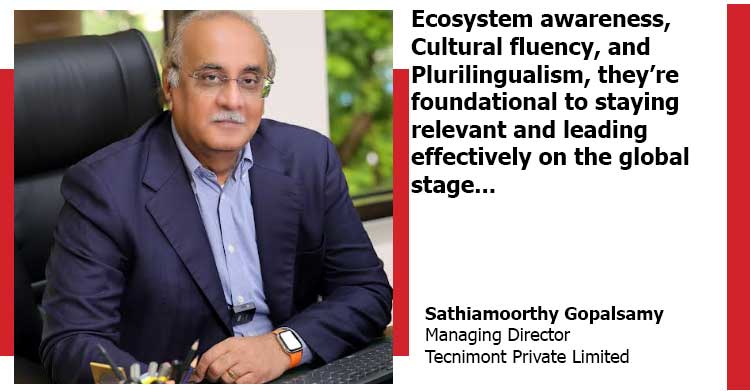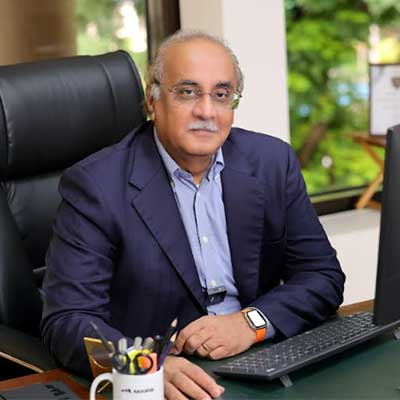How Culture, Language and Ecosystem Awareness Shape Global Careers | Sathiamoorthy Gopalsamy | Managing Director | Tecnimont Private Limited

In today’s rapidly evolving professional landscape, success is no longer measured by technical qualifications or academic degrees. Instead, it’s defined by one’s ability to adapt, communicate, and collaborate across cultural, geographic, and generational boundaries. In today’s interconnected markets and multicultural workplaces, three traits stand out as real differentiators: ecosystem awareness, cultural fluency, and plurilingualism. These aren’t optional—they’re foundational to staying relevant and leading effectively on the global stage. Understanding industry ecosystems helps professionals anticipate change. Cultural fluency builds trust across borders. Plurilingualism unlocks deeper collaboration and sharper insights. Together, they shape professionals who don’t just adapt to the global economy, they drive it.
For decades, Indian professionals have viewed English-speaking countries like the US, UK, Australia, and Canada as the primary gateways to international careers. Today, the next wave of global opportunity is also rising from new shores—Europe, Latin America, East Asia, UAE and even parts of Eastern Europe are actively inviting international talents, particularly in high-growth sectors such as energy transition, renewable energy, electric mobility, AI-driven manufacturing, and green chemicals. These aren’t just job markets. They are platforms for innovation, knowledge-sharing, and enterprise creation.
From Job Seeker to Change Maker
The world today doesn’t just need employees. It needs contributors, builders, collaborators, and increasingly, co-creators of change. Through access to global research institutions, tech accelerators, start-up incubators, and intellectual property frameworks, professionals are no longer confined to traditional roles—they’re becoming entrepreneurs, patent holders, and changemakers.
For example, take the story of an Indian engineer who began his journey in Italy’s green energy sector. Immersed in Europe’s integrated R&D and IP ecosystem, he filed a patent in smart grid optimisation. Years later, he returned to India—not with a job title, but with the confidence and insight to start a venture that now drives energy access in semi-urban regions. This is the real power of global exposure—it doesn’t just change your resume. It changes your mindset.
Beyond Degrees: The Skillset That Truly Matters
In the age of global mobility, academic qualifications are just one piece of the puzzle. What truly accelerates careers today are human-centric capabilities—emotional intelligence, cultural agility, and digital fluency. From Germany’s hydrogen transition and Norway’s sustainable shipping to France’s electric mobility drive and Belgium’s bio-chemical innovations—today’s global projects bring together cross-disciplinary, multi-cultural teams. Engineers are working with data scientists, chemists with software developers. In such settings, your ability to collaborate, navigate nuance, and lead without authority becomes just as critical as your technical expertise. In fact, a recent CII study across 23 nations estimates that addressing the global skills gap could unlock a $11.5 trillion boost to global GDP by 2028.
I started my career as a trainee engineer in Mumbai. Today, I lead the global operations at MAIRE , an Italian leading technology and engineering Group focused on advancing the Energy Transition. This journey wasn’t scripted—it was shaped by adaptability, curiosity, and an openness to go where few had gone before. The definition of employability has expanded. Today, success is not about where you studied, it’s about how well you can connect, create, and lead in diverse environments. Especially in high-impact sectors like green hydrogen, sustainable chemicals, AI-powered manufacturing, and electric vehicle (EV) mobility, the future belongs to those who can think globally and act collaboratively.
The Rise of Integrated Industries
The global shift toward sustainability and innovation is giving rise to new industries—and with them, new career frontiers. Green hydrogen, EVs, AI-powered manufacturing, and specialty chemicals are no longer futuristic—they are current and fast-growing sectors with strong hiring demand.
Take Europe’s green hydrogen ecosystem: Germany, Norway, Italy, and Spain are investing in large-scale hydrogen projects to decarbonize energy and transport. These initiatives are opening doors to professionals in R&D, systems integration, infrastructure deployment, and inter-disciplinary collaboration. Engineers are now working alongside data scientists, and chemical experts are co-developing solutions with software architects. In such settings, soft skills become vital enablers of team performance and innovation.
In the EV space, Germany, France, and the Netherlands are leading Europe’s mobility transition. Countries like Poland and Hungary are emerging as competitive manufacturing bases, offering significant roles in plant operations, quality assurance, and embedded systems design. Similarly, the rise of sustainable chemicals is opening exciting possibilities. Bio-based materials, specialty compounds, and eco-friendly industrial products are in high demand across Belgium, and Switzerland are known for cutting-edge chemical research and innovation. These hubs offer unique opportunities for Indians who want to build careers at the intersection of innovation and impact.
From Degrees to Capabilities: The New Employability Matrix
In the age of global mobility and emerging industries, academic credentials are only one part of the puzzle. As cross-border collaboration becomes the norm, cultural intelligence is emerging as a critical asset. Individuals must master cultural intelligence—understanding local nuances and adapting communication—to build trust across borders. Emotional intelligence is equally vital for managing stress and fostering teamwork in diverse, high-pressure environments. Integrity, compliance, and ESG awareness are essential, especially in regulated industries. Early-career leadership skills like persuasion and collaboration drive influence without authority. Time management and self-motivation are crucial in hybrid or remote work, while digital fluency is a baseline requirement. These skills, combined with technical expertise, define employability and accelerate career growth in the modern workplace. As global careers become the norm, institutions—both academic and corporate—must shift from passive enablers to active architects of international readiness. This means going beyond theory and embedding real-world readiness into learning ecosystems. Pre-expat training on local laws, workplace norms, and cultural etiquette must become standard. Mentorship programs should offer hands-on guidance from global professionals. And language immersion support can ease first-day anxieties and fast-track integration. The goal is simple: build bridges that empower talent to thrive anywhere in the world.
When individuals enter global ecosystems, they gain more than skills—they gain the confidence to lead, the clarity to solve complex problems, and the courage to return and build. From green energy to digital manufacturing, they’re not just part of the workforce abroad—they’re future-ready leaders for India’s transformation story.
The world today calls for professionals who can seamlessly connect the dots across continents, cultures, and capabilities. When individuals equip themselves to think beyond borders, not just geographically, but in mindset, they don’t just become job-ready for global markets. They unlock the potential to become true change makers, driving innovation, building ecosystems, and creating impact wherever they go.


